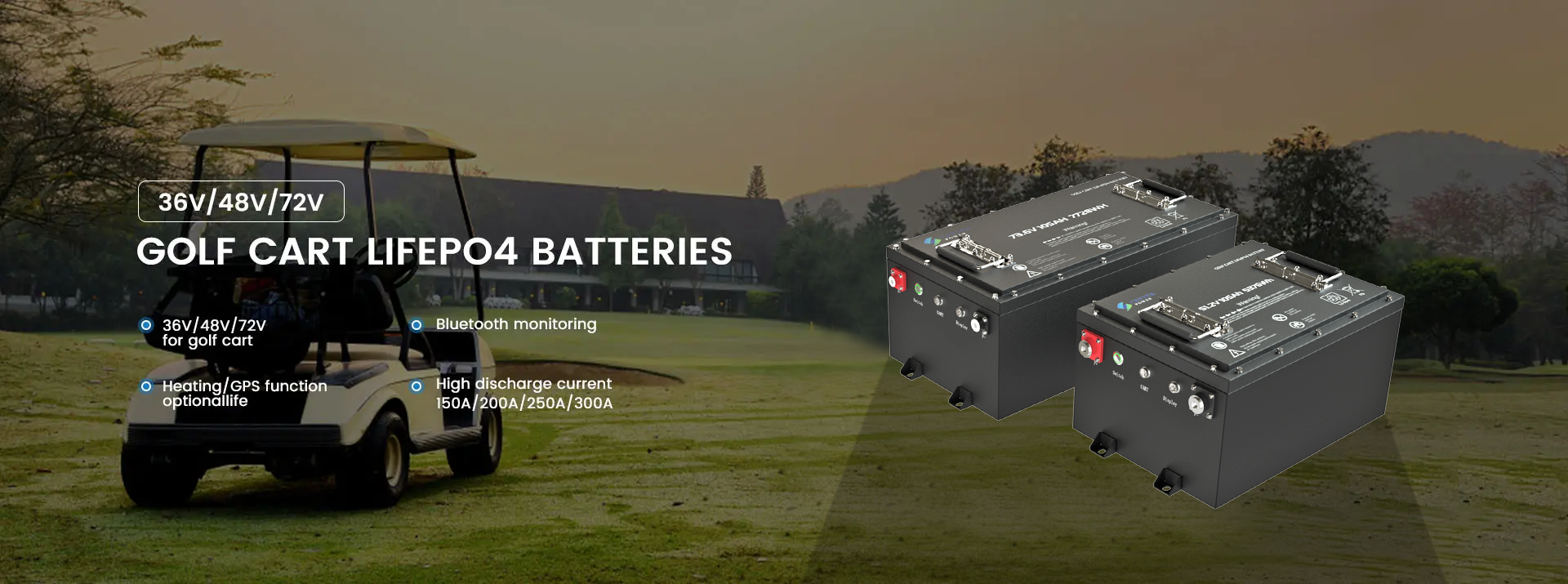Lithium batteries - Popular for use with golf push carts
These batteries are designed for powering electric golf push carts. They provide power to motors that move the push cart between shots. Some models can also be used in certain motorized golf carts, though most golf carts use lead-acid batteries specifically designed for that purpose.
Lithium push cart batteries offer several advantages over lead-acid batteries:
Lighter
Up to 70% less weight than comparable lead-acid batteries.
• Faster charging - Most lithium batteries recharge in 3 to 5 hours versus 6 to 8 hours for lead acid.
Longer lifespan
Lithium batteries typically last 3 to 5 years (250 to 500 cycles) compared to 1 to 2 years for lead acid (120 to 150 cycles).
Longer runtime
A single charge usually lasts 36 holes minimum compared to only 18 to 27 holes for lead acid.
Eco-friendly
Lithium is more easily recycled than lead acid batteries.
Faster discharge
Lithium batteries provide more consistent power to better operate motors and assistive functions. Lead acid batteries show a steady drop in power output as the charge depletes.
Temperature resilient
Lithium batteries hold a charge and perform better in hot or cold weather. Lead acid batteries quickly lose capacity in extreme heat or cold.
The cycle life of a lithium golf cart battery is typically 250 to 500 cycles, which is 3 to 5 years for most average golfers who play twice a week and recharge after each use. Proper care by avoiding full discharge and always storing in a cool place can maximize cycle life.
The runtime depends on several factors:
Voltage - Higher voltage batteries like 36V provide more power and longer runtimes than lower 18V or 24V batteries.
Capacity - Measured in amp hours (Ah), a higher capacity like 12Ah or 20Ah will run longer than a lower capacity battery like 5Ah or 10Ah when installed on the same push cart. Capacity depends on the size and number of cells.
Motors - Push carts with two motors draw more power from the battery and reduce runtime. Higher voltage and capacity are needed to offset dual motors.
Wheel size - Larger wheel sizes, especially for the front and drive wheels, require more power to rotate and reduce runtime. Standard push cart wheel sizes are 8 inches for front wheels and 11 to 14 inches for rear drive wheels.
Features - Additional features like electronic yardage counters, USB chargers, and Bluetooth speakers draw more power and impact runtime.
Terrain - Hilly or rough terrain require more power to navigate and decrease runtime compared to flat, even ground. Grass surfaces also slightly reduce runtime compared to concrete or wood chip paths.
Usage - Runtimes assume an average golfer plays twice a week. More frequent use, especially without allowing adequate time between rounds for full recharging, will result in lower runtime per charge.
Temperature - Extreme heat or cold reduces lithium battery performance and runtime. Lithium batteries operate best in 10°C to 30°C (50°F to 85°F).
Other tips to maximize your runtime:
Choose the minimum battery size and power for your needs. Higher voltage than required will not improve runtime and reduces portability.
Turn off push cart motors and features when not needed. Only power on intermittently to extend runtime.
Walk behind rather than ride when possible on motorized models. Riding draws significantly more power.
Recharge after each use and do not let the battery sit in a discharged state. Regular recharging keeps lithium batteries performing at their peak.
Post time: May-19-2023






